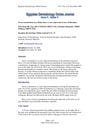 4 citations,
January 2018 in “Elsevier eBooks”
4 citations,
January 2018 in “Elsevier eBooks” Hormones are crucial for regulating body functions and imbalances can lead to health issues.
 284 citations,
February 2008 in “Pediatrics”
284 citations,
February 2008 in “Pediatrics” Chemicals and body size might change when puberty starts and progresses, but more research is needed to confirm this.
 137 citations,
June 2005 in “Climacteric”
137 citations,
June 2005 in “Climacteric” Estrogen loss during menopause worsens skin health, but hormone replacement therapy may improve it, though more research is needed.
 91 citations,
May 2005 in “The Journal of Clinical Endocrinology & Metabolism”
91 citations,
May 2005 in “The Journal of Clinical Endocrinology & Metabolism” A new mutation in the human glucocorticoid receptor reduces its function and causes resistance to glucocorticoids.
 1 citations,
January 2009
1 citations,
January 2009 A 25-year-old Malay fireman had skin bumps on his neck that were removed successfully after other treatments failed.

Silk sericin dressing with collagen heals wounds faster and improves scar quality better than Bactigras.
 November 2024 in “Frontiers in Medicine”
November 2024 in “Frontiers in Medicine” Cirrhosis affects quality of life with various symptoms, requiring a holistic, multidisciplinary approach for management.
31 citations,
July 2012 in “Journal of Lipid Research” ACBP is crucial for healthy skin in mice.
 3 citations,
October 2021 in “Brain Sciences”
3 citations,
October 2021 in “Brain Sciences” Long-term use of Risperidone may be linked to a serious skin condition in bipolar patients, affecting their overall well-being.
 June 2024 in “International Journal of Nanomedicine”
June 2024 in “International Journal of Nanomedicine” CRISPR/Cas9 has improved precision and control but still faces clinical challenges.
3 citations,
March 2022 in “The journal of investigative dermatology/Journal of investigative dermatology” Zebrafish are useful for studying and developing treatments for human skin diseases.
 November 2019 in “Harper's Textbook of Pediatric Dermatology”
November 2019 in “Harper's Textbook of Pediatric Dermatology” The document is a detailed medical reference on skin and genetic disorders.
 97 citations,
July 2006 in “Dermatologic therapy”
97 citations,
July 2006 in “Dermatologic therapy” The document concludes that accurate diagnosis and personalized treatment are important for skin problems in women with PCOS.
 295 citations,
September 2006 in “Cell Cycle”
295 citations,
September 2006 in “Cell Cycle” The conclusion is that using drugs to block the TOR pathway might slow aging and prevent age-related diseases.
 October 2020 in “Veterinary Dermatology”
October 2020 in “Veterinary Dermatology” New treatments and diagnostic methods for various animal skin conditions showed promising results.
 926 citations,
June 2010 in “BMC Medicine”
926 citations,
June 2010 in “BMC Medicine” Polycystic ovary syndrome is a complex condition that affects women's mental, reproductive, and metabolic health throughout their lives.
 29 citations,
February 2018 in “Genetics research international”
29 citations,
February 2018 in “Genetics research international” Certain genetic variations are linked to increased androgen levels in PCOS, but more research is needed to understand these connections fully.
26 citations,
July 2021 in “International journal of adolescent medicine and health” New treatments for PCOS are improving fertility and managing symptoms better.
 989 citations,
August 2007 in “The Lancet”
989 citations,
August 2007 in “The Lancet” PCOS is a complex condition with major health impacts, needing more research for better diagnosis and treatment.
 991 citations,
January 2011 in “Nature Reviews Endocrinology”
991 citations,
January 2011 in “Nature Reviews Endocrinology” The document concludes that PCOS is a complex disorder caused by both genetic and environmental factors, affecting women's health in various ways, and requires personalized treatment.
 131 citations,
August 2004 in “Best Practice & Research in Clinical Obstetrics & Gynaecology”
131 citations,
August 2004 in “Best Practice & Research in Clinical Obstetrics & Gynaecology” The conclusion is that PCOS is caused by ovarian sensitivity to hormones and disrupted hormone control, possibly due to ovarian factors, and more research is needed.
 249 citations,
November 2003 in “Clinical endocrinology”
249 citations,
November 2003 in “Clinical endocrinology” Insulin resistance is a key factor in polycystic ovary syndrome, but genetics may also contribute.
 65 citations,
May 2010 in “Current Women's Health Reviews”
65 citations,
May 2010 in “Current Women's Health Reviews” Oxidative stress is a key factor in the development of Polycystic Ovary Syndrome, and weight management can improve symptoms.
 49 citations,
November 2019 in “Egyptian Journal of Medical Human Genetics”
49 citations,
November 2019 in “Egyptian Journal of Medical Human Genetics” Certain gene variants may contribute to high androgen levels in women with polycystic ovary syndrome.
 January 2019 in “ISGE series”
January 2019 in “ISGE series” The document concludes that effectively managing PCOS requires a multifaceted approach.
9 citations,
May 2014 in “BMC medical genetics” A woman with a unique syndrome similar to TRPS has a genetic change near the TRPS1 gene, affecting its regulation.
 182 citations,
August 2016 in “Development”
182 citations,
August 2016 in “Development” ATP-dependent chromatin-remodeling complexes are crucial for gene regulation, cell differentiation, and organ development in mammals.
 430 citations,
July 2002 in “Journal of Endocrinology”
430 citations,
July 2002 in “Journal of Endocrinology” The hypothesis suggests that PCOS may start early in life due to genetic and environmental factors, influencing future reproductive and metabolic problems.
 71 citations,
January 2014 in “Journal of Proteome Research”
71 citations,
January 2014 in “Journal of Proteome Research” Women with PCOS have different levels of certain fats and proteins in their blood, which could help diagnose the condition.
 22 citations,
January 2014 in “Indian Journal of Endocrinology and Metabolism”
22 citations,
January 2014 in “Indian Journal of Endocrinology and Metabolism” Family members of North Indian women with PCOS have a high rate of metabolic syndrome.


























